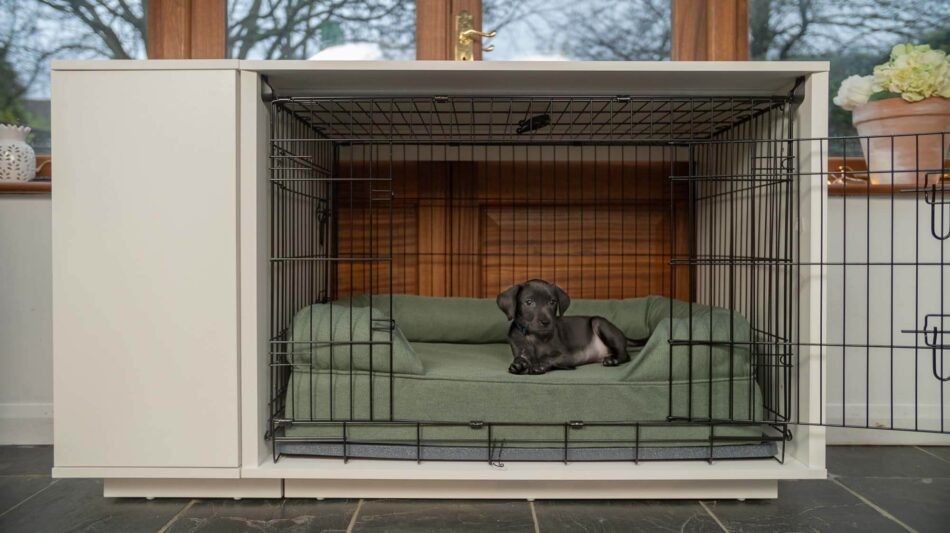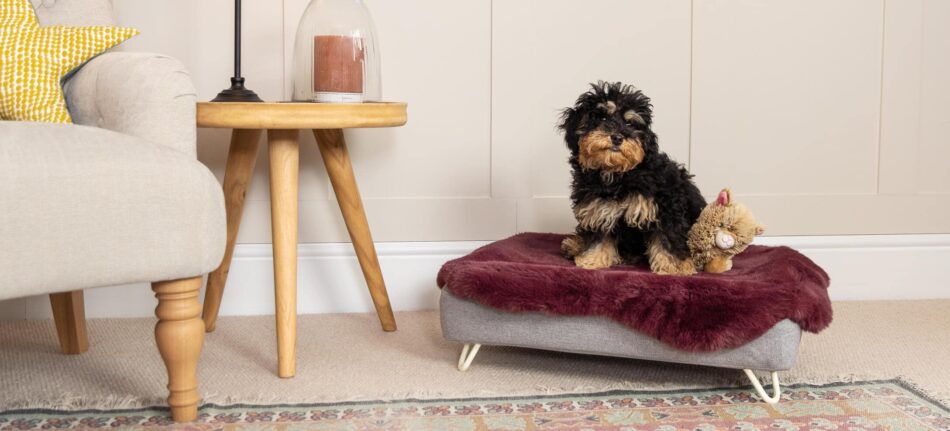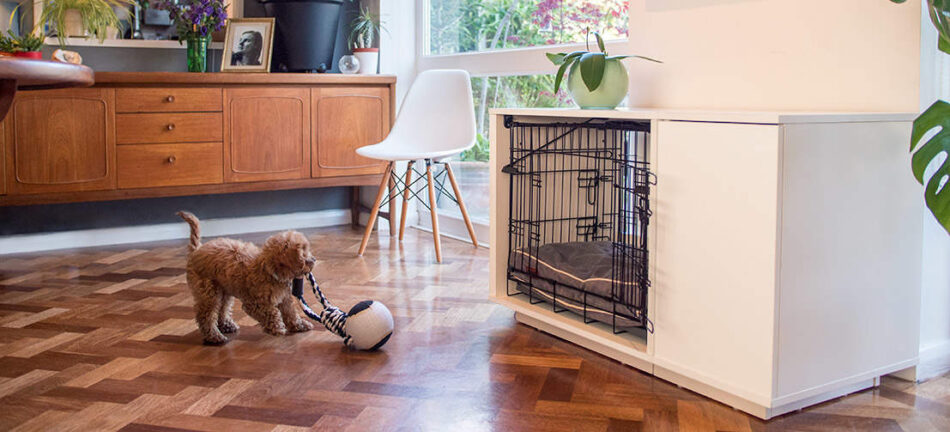How Much Sleep Do Puppies Need?
When it comes to puppies, you should know that they sleep…well…A LOT! Yes, these amazing furballs of energy can require up to a whopping 20 hours of sleep per day depending on their breed and size. That’s almost 85% of their day spent in slumber!
But is my 8 week old puppy supposed to sleep as much as a 16 week old puppy? And how do I get my puppy to sleep through the night? Just like human babies, puppies are growing quickly and sleep is an essential factor to make sure they stay healthy and strong. Whether you are a new puppy pet parent or considering a pint-sized pal, here are some things you need to know about puppy sleep!
Why do puppies need so much sleep?
Sleep is important for puppies for the same reasons it is important for children – development! All dog breeds start out life as small, four-legged furballs. Whether they grow to the size of a Great Dane or stay as small as a Chihuahua, all dogs need sleep in order to grow.
One of the biggest benefits that sleep offers puppies is healthy brain development. At their very young age, puppies are taking in tons of new sights, smells, and sounds every day! Sleep offers their brains a chance to process all the new information and compartmentalize the do’s and don’ts of being a dog.
Have you ever seen a puppy tear across a room like a tiny tornado only to collapse into a snoozy nap seconds later? Puppies, like humans, require rest in order to restore and conserve their energy. Getting lots of sleep in the early weeks/months of life means puppies are just preparing to be healthy, energetic dogs for years to come!
But why do they need to sleep for 75-85% of the day? The “puppy stage” is short relative to the average life of a dog – lasting approximately 6 months to 2 years depending on dog breed. So obtaining more sleep on the front end helps to build their developing immune system to be healthy and strong adult dogs. When it comes to puppies and sleep, “let sleeping dogs lie”!
Typical puppy sleep
If you’ve ever raised a human baby you know all too well that life in those first few months consists of a revolving schedule of eat, sleep, play, and poop. Guess what? Puppies are much the same! As they grow and mature, puppies – like humans – will need less sleep, but here is a breakdown of average sleep hours at the different stages of puppyhood.
Birth – 8 weeks: Puppies get the most sleep in these first few weeks of life. On average, you can expect your pint-sized pal to log 18-20 hours of snoozy time each day. Frequent, short-burst naps are how they start their lives.
10-12 weeks: Your puppy is growing and sleep is still of the utmost importance! While they may still be logging lengthy sleep schedules of 18-20 hours per day, you will start to notice they have more energy during their wake hours – that’s a good thing! This means all that sleep is giving their bodies exactly what it needs.
12-16 weeks: As your puppy nears the 3 month old mark, they may start shortening their naps a bit during the day and increasing their length of sleep stretches at night. Average daily sleep for puppies this age is around 16-18 hours and that will depend heavily on your dog’s age and breed. Large breed dogs have to grow more quickly than smaller breed dogs to reach the same age maturity, so you may notice a Labrador Retriever sleeping longer than a Pug at this stage.
16-18 weeks: By now, you and your puppy have (hopefully!) settled into a sleep routine and schedule. This is the perfect time to start training your puppy! Learning new commands and how to walk on a leash are examples of “firsts” you can introduce to your puppy at this age. This is also a great time to start socialization with other dogs as most puppies will have been fully vetted at this time to safely be around the pack!
Sample puppy sleep schedule
Just like babies, puppies naturally thrive on a routine! So the earlier you can create and stick to a schedule, the better! Here is a sample sleep schedule for puppies under 16 weeks of age:
MORNING
Potty first thing!
Eat breakfast
Potty (repetition is key here!)**
Play with toys
Nap
Wake and potty
AFTERNOON
Eat lunch
Explore and play
Potty
Nap
Potty
Nap (see a trend here?)
EVENING
Eat dinner
Play with toys
One last potty before bed
Nighttime sleep
Several more potty breaks throughout the night (especially in the early months!)
** Rule of thumb when it comes to puppies and potty training: every month of age equals the amount of hours they can go between potty breaks. For example, a 2 month old puppy will need to go potty every 2 hours, a 3 month old puppy will need to go potty every 3 hours, and so on. So be sure to position your puppy’s crate close by so you can hear the “I need to pee” whines….which could start way before dawn! But with every passing month of age, this will get later and later!
How to get my puppy to sleep through the night
The goal for most pet parents is to get their dogs to mimic their sleep patterns by logging most of their zzz’s at night. For puppies, this can be a hard task as they are still too young to go several hours between potty breaks. So, while it’s unlikely that your puppy will sleep a straight 8 hours a night right away, there are some things you can do to eventually get there!
Exercise, exercise, exercise!
A tired dog is a happy dog and that is true for puppies, too! One of the best things you can do to promote night time sleep is make sure your puppy has lots of exercise throughout the day. In between naps, be sure to stimulate their minds with interactive games, like tug-of-war with the toys! Having a dedicated toy storage box helps cue the puppy that it’s time to use some energy!
Calm, relaxed, slow
Like humans, puppies learn by seeing the environment around them. And we all know that a calm environment promotes better sleep! So try and get all of the play and exercise in before dinner and then start to slow down and relax at least an hour before bed. Remember, puppies thrive on routines, so keep night time consistent and they will begin to learn to relax sooner.
Potty, potty, potty!
Make sure your puppy actually does “go potty” one last time before settling into bed! These tiny furballs get distracted easily and sometimes go outside but don’t actually “go outside” – so be sure they are emptied out before bed!
Close, comfortable and chews
In an effort to make everyone’s sleep as best as possible, try and keep your puppy’s crate close by you so you can hear them when they whimper for a wee outside! Omlet’s Fido Studio Crate is a great option as it seamlessly doubles as a nightstand or end table as well as your puppy’s sleeping quarters! Sleeping close to you will also make your puppy more comfortable – a good comfy bed will help, too! And don’t forget a chew toy or blanket to put beside them! Like human babies, puppies experience teething, and chewing can be a calming night time activity to help soothe them back to sleep!
Make no bones about it – all dogs like to sleep! But some breeds do like to hit the snooze button more than others. While these breeds are not exempt from sporadic puppy sleep, they are more likely to sleep longer – and more often! – as adults!
Saint Bernard
Pug
Great Dane
Basset Hound
English BullDog
Owning a puppy can be an exciting and exhausting experience! But the rewards of being a dog owner far outweigh the few sleepless nights you may encounter when they are puppies! With an established routine and cozy sleeping quarters, your puppy will quickly learn great sleeping habits! And happy sleeping puppies usually grow into happy sleeping dogs!
This entry was posted in Dogs


